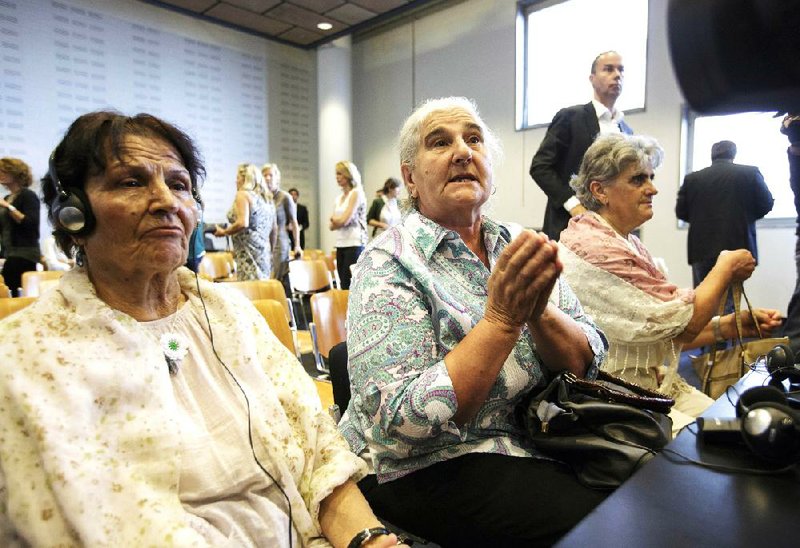THE HAGUE, Netherlands -- A court on Wednesday ordered the Netherlands to compensate the families of more than 300 Bosnian Muslims killed after Dutch troops handed them over to Bosnian Serb forces in 1995.
The civil court in The Hague cleared the Netherlands of liability in the massacre of nearly 8,000 others, saying that although those people sought protection in the United Nations safe haven of Srebrenica they were never directly in the custody of the Dutch troops. The ruling can be appealed.
The court ruled that the Dutch peacekeeping troops could have protected the 300-plus men and boys who were among thousands of Muslims -- mainly women, children and elderly people -- taking shelter in a Dutch compound inside the U.N.-declared safe haven of Srebrenica.
The troops -- part of a Dutch U.N. battalion known as Dutchbat -- handed over those in the compound two days after the town fell. The Bosnian Serb troops then killed the Muslim men and boys, who "would have survived if Dutchbat had acted properly," said Presiding Judge Larissa Alwin.
The court said the Netherlands could not be held responsible for people who had taken shelter in the town but who were not inside the Dutch compound. Those included thousands of other Bosnian Muslim men and boys who fled into the nearby forests when the town fell and were later rounded up and killed by Bosnian Serb forces.
"Dutchbat cannot be held liable for their fate," the ruling read.
In an emotionally charged hearing attended by a handful of victims' relatives, Alwin said the peacekeepers should have known that the men taken from the compound would be slain because there was already evidence of the Serbs committing war crimes.
"By cooperating in the deportation of these men, Dutchbat acted unlawfully," Alwin said.
On July 13, 1995, the peacekeepers bowed to pressure from Bosnian Serb forces commanded by Gen. Ratko Mladic and forced thousands of Muslim families out of their fenced-off compound.
The Bosnian Serb forces sorted the Muslims by gender, then trucked the males away and began killing them in what would become the bloody climax to the 1992-95 Bosnian war, a slaughter that international courts have ruled was genocide. The war claimed 100,000 lives in all.
The Srebrenica bodies were plowed into hastily made mass graves, which were later bulldozed and scattered among other burial sites in an attempt to hide the evidence.
Relatives of the dead welcomed the limited finding of liability Wednesday, but lamented that it did not go further.
"Obviously the court has no sense of justice," said Munira Subasic, president of the Mothers of Srebrenica group that filed the case. "How is it possible to divide victims, and tell one mother that the Dutch state is responsible for the death of her son on one side of the wire and not for the son on the other side?"
The court did not say how much compensation the families should receive. That will be worked out between lawyers and the government once any appeals have run their course. A lawyer for the relatives, Marco Gerritsen, said he would study the 89-page ruling before deciding whether to appeal.
It remains to be seen what effect the ruling will have on U.N. recruitment for peacekeeping missions.
Defense Ministry spokesman Klaas Meijder said the Dutch government began insisting on stricter safeguards for its troops involved in U.N. missions after the Srebrenica massacre, but wouldn't speculate on whether the ruling would have a further impact.
But analysts said the judgment could add to increasing concerns among Western nations about their involvement in peacekeeping missions.
"Peacekeeping for quite a long time has been deeply fragile. Traditional donors have been pulling back," said David Connolly of The Hague Institute for Global Justice.
The United Nations itself is exempt from prosecution. Earlier in the long-running case, judges said relatives of the victims could not sue the U.N. itself because its immunity is a cornerstone of peacekeeping operations.
U.N. deputy spokesman Farhan Haq said Wednesday that the organization would need to study the ruling before commenting on it.
The Dutch peacekeepers' involvement in the Srebrenica massacre has long been a source of national trauma. In 2002, the government of then-Prime Minister Wim Kok resigned after a report that blamed Dutch authorities and the U.N. for sending ill-equipped troops without a strong enough mandate to prevent the slaughter in Bosnia.
A Section on 07/17/2014

